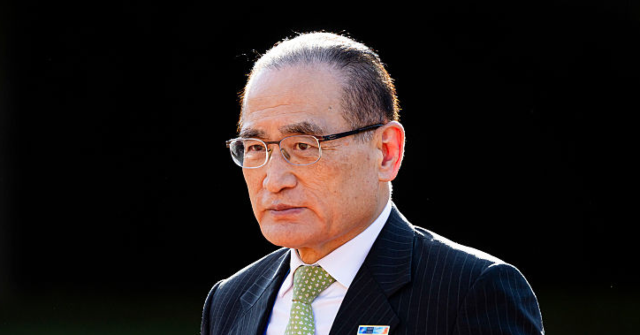South Korea sent its National Security Adviser Wi Sung-lac to Washington this week to meet with top officials in President Donald Trump’s administration, telling reporters that his government sought to handle security concerns alongside trade negotiations in anticipation of the August 1 tariff deadline.
President Trump launched a global restructuring of America’s trade policies on April 2, which he dubbed “Liberation Day.” Lamenting what he called unfair trade imbalances in which countries were enjoying access to the lucrative American market while imposing protectionist policies on American products, Trump invited every country that trades with America to renegotiate their terms and come to agreements that treat American products more fairly. This week, Trump announced that a waiver issued on the tariffs announced in April to allow negotiations would expire on August 1, pressuring affected countries to offer better conditions for a deal.
Trump published a letter on Monday addressed to South Korea and Japan specifically in which he announced that both would face a 25-percent tariff on all goods entering America if they did not secure a new trade deal by August 1.
“If for any reason you decide to raise your Tariffs, then, whatever the number you choose to raise them by will be added onto the 25% that we charge,” Trump added as a warning.
Only two countries so far, the United Kingdom and Vietnam, have finalized their processes and implemented a new trade deal with America that removes the looming tariffs threat. South Korea has struggled to make progress with the Trump administration due to a variety of factors, including inaugurating a leftist president on June 3. America is South Korea’s second-largest trade partner after China, and the country relies heavily on exporting cars and cosmetics, among other goods. As part of the armistice agreement that ended active hostilities in the Korean War in 1953, Seoul relies heavily on the U.S. military to help protect its border from the rogue communist regime in North Korea.
Wi, the national security adviser, met with American Secretary of State Marco Rubio and several other top Trump administration officials this week, spending four days in Washington. According to the South Korean news agency Yonhap, Wi said following those meetings that his government hoped to convince the White House to accept a “package deal” that addressed trade issues along with security and defense.
“We raised a range of issues spanning trade, investment, procurement, and security, and suggested moving forward with negotiations by taking this comprehensive package into account,” Wi told reporters after his meeting with Rubio. The adviser addressed concerns Trump has vocalized that South Korea benefits too handsomely from the support of the U.S. military and that costs to the American taxpayer are too steep, insisting that Seoul is working to increase its defense spending.
“We’re gradually increasing our overall defense spending in line with international trends. Our contribution is substantial and there’s potential for it to grow further,” he reportedly said.
He also indicated that he sought to organize a meeting between Trump and South Korean President Lee Jae-myung as soon as possible.
“I proposed holding a Korea-U.S. summit at an early date to help facilitate mutually beneficial agreements on key pending issues, and Secretary Rubio expressed his support,” Yonhap quoted Wi as saying.
Lee has spoken to Trump in only one phone call since his inauguration on June 3. The South Korean president hoped to meet Trump in person during the G-7 summit in June hosted by Canada, but Trump left the event early to address the war between Israel and Iran, which had yet to culminate at the time. Attempts to meet Trump in person have since failed.
Lee became South Korea’s sixth president in five months in June, following the chaos that ensued when his predecessor, Yoon Suk-yeol, attempted to impose martial law on the country in December. The martial law decree lasted mere hours before the National Assembly, where Lee led the then-opposition Democratic Party, voted it down and rapidly began an impeachment process against Yoon. Yoon was ousted from office and replaced in a special election that Lee won.
A hardline leftist with minimal foreign policy experience, Lee entered the presidency in an unfavorable position to address the trade situation with Trump. He has repeatedly expressed interest in improving Seoul’s relationships with China, North Korea, and Russia, a disposition unlikely to be warmly received in Washington.
In addition to Wi’s comments, the South Korean Trade, Industry, and Energy Ministry addressed the trade situation on Tuesday, vowing to “intensify” talks with the White House.
“We will use the remaining time to accelerate negotiations and seek a mutually beneficial outcome to quickly resolve the uncertainty created by these tariffs,” the ministry said in a statement. “In addition to improving domestic regulations and easing restrictions that have drawn U.S. criticism, we aim to strengthen bilateral manufacturing partnerships in key sectors.”
The Ministry interpreted the August 1 tariff deadline as an extension of the original July date, a recognition that the teams needed more time to hash out details.
“Although we have engaged in intensive negotiations based on a ‘national interest first’ principle within the limited time since the new administration took office, it is true that there was insufficient time to reach agreement on all issues,” the Trade Ministry wrote.
Follow Frances Martel on Facebook and Twitter.
Read the full article here


